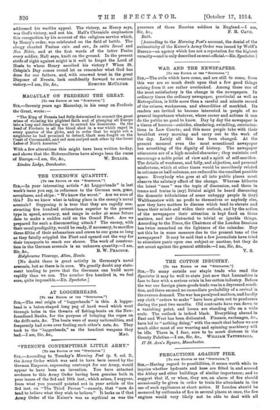WAR AND THE NEWSPAPERS.
[To THE EDITOR OF THE "SPECTATOR."]
SIR,—The evils which have come, and are still to come, from this war are so much dwelt upon that a few good things arising from it are rather overlooked. Among these one of the most satisfactory is the change in the newspapers. In ordinary times the ordinary newspaper, provincial as well as Metropolitan, is little more than a careful and minute record of the crimes, weaknesses, and absurdities of mankind. Its readers are invited to become interested in people of no general importance whatever, whose career and actions it can do the public no good to know. Day by day the newspaper is a tissue of horrors—suicides, slandering, swindling, recrimina- tions in Law Courts ; and this mess people take with their breakfast every morning and carry out to the work of the day. Lately all this has been changed. At the present moment even the most sensational newspaper has something of the dignity of history. The newspaper utterances are of a high-minded character ; they maintain and encourage a noble point of view and a spirit of self-sacrifice. The details of weakness, and folly, and abjection, and personal misfortune, which at other times would be mercilessly related in columns or half-columns, are reduced to the smallest possible space. Everybody who goes at all into public places must observe the salutary effect of the change. Whereas hitherto the latest " case " was the topic of discussion, and those in trams and trains in (say) Bristol might be heard discussing the domestic tribulations of some unhappy people in (say) Walthamstow with no profit to themselves or anybody else, now they have matters to discuss which tend to elevate and brace their minds and widen their outlook, and by the action of the newspapers their attention is kept fixed on these matters, and not distracted to trivial or ignoble things. According to the Times, the Chairman of the London Sessions has twice remarked on the lightness of the calendar. May not this be in some measure due to the present tone of the newspapers ? It may be said that a few journalists have tried to stimulate panic upon one subject or another, but they do not count against the general attitude.—I am, Sir, &c., V. S.


































 Previous page
Previous page